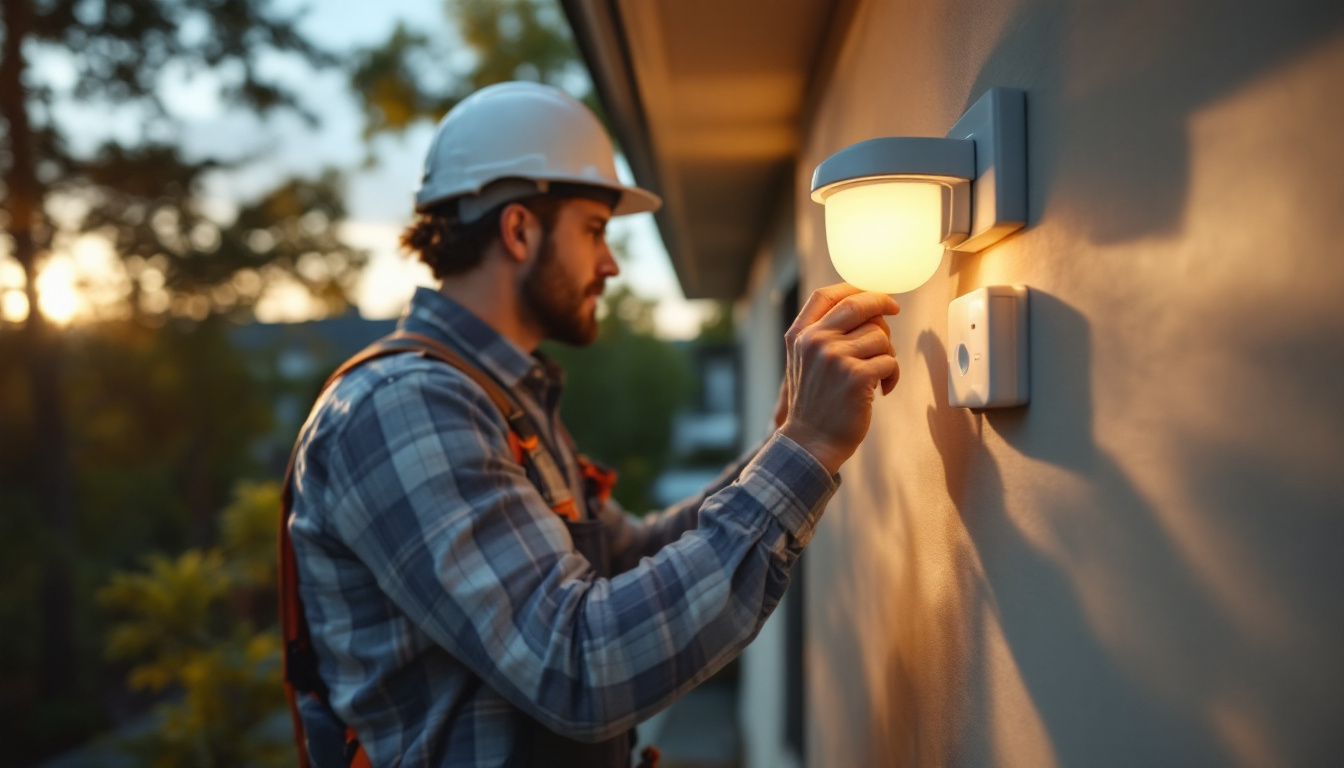
In the ever-evolving landscape of outdoor lighting, solar lights have emerged as a popular choice for both residential and commercial applications. For lighting contractors, understanding the nuances of solar technology and selecting the brightest solar lights can significantly enhance project outcomes. This article delves into essential considerations, product recommendations, and practical advice tailored specifically for lighting contractors.
Before diving into product recommendations, it’s crucial to grasp the fundamentals of solar lighting technology. Solar lights harness sunlight through photovoltaic cells, converting it into electrical energy stored in batteries. This energy powers LED bulbs, providing illumination without the need for traditional electrical wiring. The technology has evolved significantly over the years, leading to more efficient solar panels and longer-lasting batteries, which enhance the overall performance of solar lighting systems.
Solar lights consist of several key components: solar panels, batteries, LED bulbs, and sensors. Each component plays a vital role in the overall performance and efficiency of the lighting system. Understanding how these components interact can help contractors make informed decisions when selecting products for their projects. For example, the quality of the solar panel directly affects the amount of energy harvested, while the type of battery determines how long the lights can operate during low-light conditions. Additionally, sensors, such as motion detectors or light sensors, can optimize energy use by activating lights only when needed, further enhancing efficiency.
There are various types of solar lights available on the market, including pathway lights, flood lights, and decorative lights. Each type serves a different purpose and is suited for specific applications. For instance, pathway lights provide subtle illumination for walkways, while flood lights offer powerful lighting for larger areas. Furthermore, decorative solar lights can enhance the aesthetic appeal of gardens or patios, often designed in artistic shapes or colors. Some models even include features such as color-changing LEDs or integrated speakers, allowing for a multifunctional outdoor experience that combines lighting with ambiance.
Solar lighting offers numerous advantages, particularly in outdoor settings. They are energy-efficient, cost-effective, and environmentally friendly. Additionally, the absence of wiring simplifies installation, making solar lights an attractive option for contractors looking to streamline their projects. The independence from the electrical grid also means that solar lights can be installed in remote locations where traditional power sources are unavailable. Moreover, advancements in battery technology have led to improved performance in various weather conditions, ensuring that solar lights remain reliable even during cloudy days or winter months. This resilience makes them an ideal choice for both residential and commercial applications, providing safety and security without the ongoing costs associated with conventional lighting systems.
When selecting solar lights, brightness is a critical factor. Measured in lumens, brightness levels can vary significantly among different products. For contractors, understanding how to evaluate brightness and performance is essential for meeting client expectations.
Lumens indicate the total amount of visible light emitted by a source. For outdoor solar lights, a higher lumen count generally translates to brighter illumination. Contractors should consider the intended use of the lights; for example, security lighting may require higher lumens than decorative lighting. Additionally, it is important to recognize that the perceived brightness can also be influenced by factors such as the color temperature of the light. Warmer lights, typically around 2700K to 3000K, can create a cozy atmosphere, while cooler lights, above 4000K, may appear brighter and more clinical. This understanding can help contractors make more informed decisions based on the ambiance they wish to create.
Runtime refers to how long a solar light can operate on a full charge. Factors such as battery capacity, solar panel efficiency, and the intensity of sunlight in the installation area affect runtime. Contractors should assess these factors to ensure that the selected lights meet the specific needs of their projects. In addition to these considerations, the quality of the solar panels plays a significant role in overall efficiency. Higher-quality panels can convert sunlight into energy more effectively, resulting in longer runtimes even on partially cloudy days. Furthermore, advancements in battery technology, such as lithium-ion batteries, have improved energy storage, allowing for longer operating times and faster charging. Understanding these technological nuances can empower contractors to choose the best solar lighting solutions that align with their project requirements and client expectations.
Selecting the brightest solar lights requires a careful evaluation of various factors, including the application, environment, and specific client needs. Here are some key considerations for lighting contractors.
Different applications demand different lighting solutions. For instance, a garden may benefit from decorative solar lights that enhance aesthetics, while a parking lot requires robust flood lights for safety. Understanding the specific requirements of each project is crucial for making the right choice. Additionally, pathways and walkways can greatly benefit from solar path lights, which not only illuminate the area but also guide visitors safely through the space. In commercial settings, solar wall lights can provide security while also enhancing the building’s exterior appeal. By tailoring the lighting to the specific needs of each area, contractors can create both functional and inviting spaces.
The installation environment plays a significant role in the performance of solar lights. Factors such as climate, shading from trees or buildings, and geographical location can impact the efficiency of solar panels. Contractors should assess these elements to ensure optimal performance of the selected lights. For example, in areas with frequent cloud cover or heavy rainfall, it may be beneficial to choose solar lights with larger battery capacities or those that utilize advanced technology to maximize energy absorption. Furthermore, understanding the local wildlife can also be important; certain solar lights can attract insects, which might not be ideal for gardens or outdoor dining areas. A thorough environmental assessment allows for a more informed selection process, ensuring that the chosen lights will perform well over time.
Every client has unique preferences and budget constraints. Engaging in open discussions with clients about their needs and expectations can help contractors recommend the most suitable solar lighting solutions. Balancing quality and affordability is key to maintaining client satisfaction. It’s also essential to educate clients about the long-term savings associated with solar lighting, such as reduced electricity bills and minimal maintenance costs, which can help justify the initial investment. Additionally, offering a range of styles and functionalities can cater to diverse tastes, from sleek modern designs to more traditional options. By presenting a variety of choices that align with their vision, contractors can enhance the overall client experience and foster lasting relationships.
Proper installation is vital for maximizing the performance and longevity of solar lights. Lighting contractors should follow best practices to ensure that the lights operate efficiently and effectively.
Placement of solar lights is critical for achieving maximum exposure to sunlight. Contractors should consider factors such as the angle of the solar panel and potential obstructions that may cast shadows. Ideally, solar lights should be installed in areas that receive direct sunlight for most of the day.
For outdoor applications, ensuring that solar lights are securely mounted is essential to prevent damage from weather conditions or vandalism. Depending on the type of light, contractors may need to use stakes, brackets, or other mounting hardware to ensure stability.
While solar lights require minimal maintenance, regular checks can help prolong their lifespan. Contractors should advise clients on the importance of cleaning solar panels and checking battery performance periodically. This proactive approach can prevent issues and enhance the overall efficiency of the lighting system.
With numerous brands and products available, choosing the right solar lights can be overwhelming. Here are some reputable brands known for their high-quality solar lighting solutions.
Brand A is recognized for its cutting-edge solar technology and a wide range of products. Their solar flood lights are particularly popular for commercial applications, offering high lumen outputs and extended runtimes. Contractors appreciate the reliability and performance of Brand A’s products.
For contractors working with tight budgets, Brand B offers a selection of affordable solar lights without compromising on quality. Their pathway lights and decorative options are ideal for residential projects, providing a balance of aesthetics and functionality.
Brand C specializes in high-end solar lighting solutions, catering to clients who prioritize performance and design. Their products often feature advanced technology, such as smart sensors and customizable settings, making them suitable for sophisticated outdoor lighting projects.
The solar lighting industry is continuously evolving, with new technologies and trends emerging regularly. Staying informed about these developments can help lighting contractors remain competitive and offer the best solutions to their clients.
Smart technology is making its way into solar lighting, allowing for enhanced control and customization. Features such as remote operation, motion sensors, and integration with smart home systems are becoming increasingly popular. Contractors should consider these advancements when recommending solar lights to clients.
Advancements in battery technology are also shaping the future of solar lighting. Newer battery types offer improved efficiency, longer runtimes, and faster charging times. Contractors should stay updated on these developments to ensure they are providing clients with the most effective solutions.
As sustainability becomes a priority for many consumers, eco-friendly innovations in solar lighting are gaining traction. Products made from recycled materials or designed for easy recycling at the end of their life cycle are becoming more prevalent. Contractors can leverage these eco-friendly options to appeal to environmentally conscious clients.
In conclusion, the selection and installation of the brightest solar lights outdoor require careful consideration and expertise. By understanding solar technology, evaluating brightness and performance, choosing the right products, and following installation best practices, lighting contractors can deliver exceptional results for their clients. Staying informed about industry trends and advancements will further enhance their ability to provide innovative and effective solar lighting solutions. With the right approach, contractors can not only meet but exceed client expectations, paving the way for successful projects and satisfied customers.
Ready to elevate your lighting projects with the brightest solar lights on the market? Look no further than LumenWholesale, where we provide lighting contractors with superior, spec-grade lighting products at unbeatable wholesale prices. Our commitment to quality and affordability means you can access a vast selection of reliable, high-performance lighting without the burden of inflated markups. Plus, with the convenience of free shipping on bulk orders, you can secure premium lighting solutions at the best value — all without hidden fees or compromises. Don’t let your projects be dimmed by subpar lighting. Choose LumenWholesale for a seamless blend of quality, affordability, and convenience. Wholesale Lighting at the Best Value awaits you.

Explore the essential considerations for lighting contractors when working with recessed fluorescent lights.

Discover the essential guide for lighting contractors on outdoor light sensors.

Discover the latest trends in LED manufacturing that every lighting contractor needs to know.

Discover the comprehensive guide to home LED lights tailored for lighting contractors.